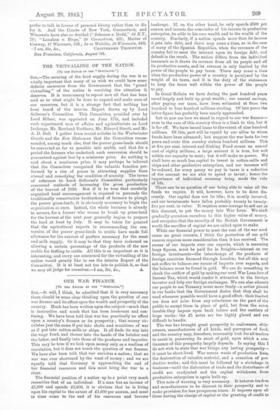THE VICTUALLING OF THE NATION.
[To TEl EDITOR OW TEL SPECTATOR."] Sses,—The securing of the food supply during the war is so vitally important that many of us wish we could have some definite assurance from the Government that the "grand victualling" of the nation is receiving the attention it deserves. It is . unnecessary to repeat now all that has been said as to what might be done to expand and make sure of our resources, but it is a strange fact that nothing has been heard of the interim Report drawn up by Lord Selborne's Committee, This Committee, presided over by Lord Milner, was appointed on June 17th, and included such experienced men of affairs and agriculturists as Lord Inch cape, Mr. Rowland Prather°, Mr. Edward Strutt, and Mr. A. D. Hall. I gather from recent articles in the Westminster Gazette and the New Statesman that the Committee recom- mended, among much else, that the poorer grass-lands should be converted as far as possible into arable, and that for a period the farmers who undertook such conversion should be guaranteed against loss by a minimum price. As nothing is said about a maximum price, it may perhaps be inferred that the Committee recognized the valuable function per- formed by a rise of prices in attracting supplies from abroad and remedying the condition of scarcity. The terms of reference to Lord Selberne's Committee particularly concerned methods of increasing the gross production of the harvest of 1916. But if it be true that carefully organized local encouragement is required to persuade the traditionally conservative brotherhood of farmers to plough the poorer grass-lands, it is obviously necessary to begin the organization at once. Indeed, the whole business is already in arrears, for a farmer who means to break up grass-land for the harvest of the next year generally begins to prepare the land at least by July. It may be taken for granted that the agricultural experts in recommending the con- version' of the poorer grass-lends to arable have made full allowance for the amount of pasture necessary for the meat and milk supply. Or it may be that they have reckoned on allowing a certain -percentage of the products of the new arable for feeding to cattle. All this is as important as it is interesting, and every one concerned for the victualling of the nation would greatly like to see the interim Report of the Committee. It is at least not too late to publish it, so that we may all judge for ourselves.—I am, Sir, See, A.


































 Previous page
Previous page